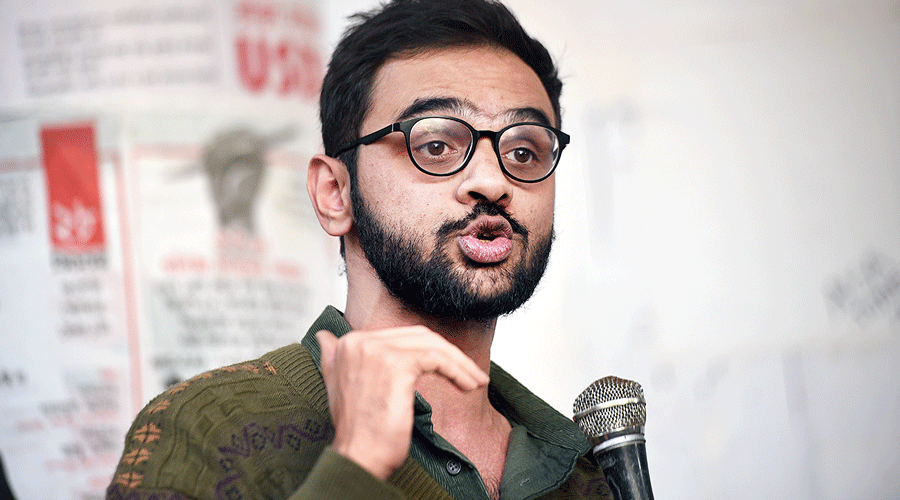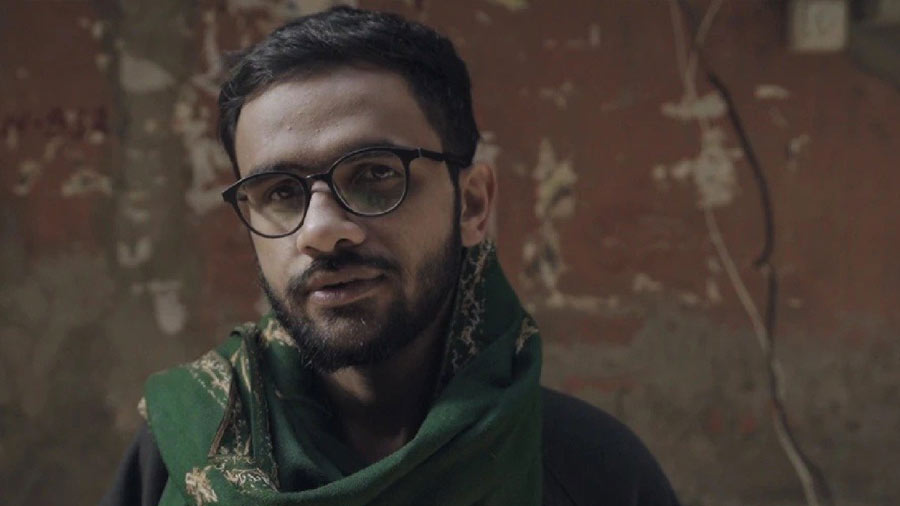Delhi High Court on Tuesday denied bail to rights activist Umar Khalid who has been in jail for two years, charged under the anti-terrorism law UAPA and awaiting trial in the 2020 Delhi riots conspiracy case.
The division bench of Justices Rajnish Bhatnagar and Siddharth Mridul dismissed Khalid’s bail plea, holding the allegations against him “prima facie true”.
The high court cited Khalid’s membership of several WhatsApp groups that had been formed allegedly to plan protests against the new citizenship regime that preceded the riots; his speech calling for protests during the February 2020 visit by then US President Donald Trump that coincided with the riots; his calls to co-accused; and the testimonies of confidential witnesses.
It took exception to Khalid’s use of slogans like “inquilabi salam”, seeing in them a call to revolution that it suggested was contrary to Jawaharlal Nehru’s idea of democracy.
The bench said the “allegations against the appellant are ‘prima facie true’ and hence, the embargo created by Section 43D(5) of UAPA applies squarely with regard to the consideration of grant of bail to the appellant”.
Section 43D(5) disallows bail if there are “reasonable grounds for believing that the accusation against such person is prima facie true”.
Last year, several retired judges of the higher courts had spoken out against the section, which makes bail very hard to obtain as evidence is difficult to test before a trial.
Jesuit Stan Swamy, who was an accused in the Elgaar Parishad-Maoist links case, had challenged this section before Bombay High Court before he died of post-Covid complications in custody last year.
Of the 18 accused charge-sheeted in the Delhi riots conspiracy case, six are out on bail. Among them are former Jamia Millia Islamia student Safoora Zargar, who was granted bail because of her pregnancy; SIM card seller Faizan Khan, the charges against whom were based entirely on witness statements; Jawaharlal Nehru University students Natasha Narwal and Devangana Kalita, and Jamia student Asif Iqbal Tanha.
The three students were granted bail on the grounds that there was insufficient prima facie evidence and that the State had misinterpreted laws to suppress dissent.
All these five were granted bail by Delhi High Court, and the bench that freed the three students included Justice Mridul, who was also on the bench that refused bail to Khalid on Tuesday.
Former Congress councillor Ishrat Jahan was the only accused to be released by a trial court. She was granted bail on the ground that she wasn’t present in northeast Delhi during the riots, nor was she a member of the WhatsApp groups under the scanner.
Ishrat was released after almost two years in jail, during which she had complained of repeated assaults by inmates in Mandoli prison. She had been denied medical bail after she injured her spine in a fall in the prison.
Tuesday’s judgment says: “The protest planned was ‘not a typical protest’ normal in political culture or democracy but one far more destructive and injurious geared towards extremely grave consequences…. The attack on police personnel by women protesters in front only followed by other ordinary people and engulfing the area into a riot is the epitome of such premeditated plan and as such the same would prima facie be covered by the definition of ‘terrorist act’.”
It adds: “The name of the appellant finds recurring mention from the beginning of the conspiracy till the culmination of the ensuing riots. Admittedly, he was a member of the WhatsApp group of Muslim students of JNU. He participated in various meetings at Jantar Mantar, Jangpura Office, Shaheen Bagh, Seelampur, Jaffrabad and Indian Social Institute on various dates. He was a member of the DPSG group.”
The Delhi Protests Solidarity Group was formed to protest the new citizenship matrix.
“He (Khalid) referred to the visit of the President of USA to India in his Amrawati speech. The CDR (call detail records) analysis depicts that there had been a flurry of calls that happened post riots amongst the appellant and other co-accused. The cumulative statement of the protected witnesses indicates the presence and active involvement of the appellant in the protests, engineered against the CAA/NRC,” the judgment says.
“Admittedly these protests metamorphosed into violent riots in February 2020, which began by firstly choking public roads, then violently and designedly attacking policemen and random members of the public, whereat firearms, acid bottles, stones etc. were used, resulting in the admitted and sad loss of 53 precious lives and the destruction of property worth several crores. These protests & riots prima facie seem to be orchestrated at the conspiratorial meetings held from December 2019.”
The court looked with suspicion at Urdu slogans used by Khalid that are common currency among mainstream communist parties in South Asia.
The judgment says: “The Ld. Sr. Counsel (Khalid’s lawyer Trideep Pais) tried to explain the meaning & import of ‘Inquilabli Salam’ (revolutionary salute) and ‘Krantikari Istiqbal’ (revolutionary welcome) by submitting that these words were used for greeting everyone and inviting the spirit of revolution and that these words were used in his speech in the context of people standing against a discriminatory law and were protesting against it and by no stretch of imagination, the use of the words ‘inquilab’, ‘krantikari’, or revolution can be termed as a crime. It was also submitted that it was a call for an opposition to an unjust law and in any case the appellant did not call for violence….
“However, this court is not impressed by the argument of the appellant in as much as the call to revolution does not have to affect only the immediate gathering. The call to revolution may affect many beyond those who were visibly present, which is why this court finds it apt to mention Robespierre, who was at the vanguard of the French revolution.
“This court is of the view that possibly, if the appellant had referred to Maximilien Robespierre for what he meant by revolution, he must have also known what revolution meant for our freedom fighter & first Prime Minister. The very fact that Pandit Jawaharlal Nehru believed that democracy has made revolution superfluous after independence and how it meant the complete opposite of a bloodless change. Revolution by itself isn’t always bloodless, which is why it is contradistinctly used with the prefix -- a ‘bloodless’ revolution.”
A source close to Khalid said he was expected to approach the Supreme Court for bail.
Legal activist Prashant Bhushan tweeted: “The rejection of Umar Khalid’s bail by the Delhi HC is unjust. There is absolutely no credible evidence against Umar reg (regarding) his involvement with any conspiracy or violent activity. On the contrary videos of all his speeches show him preaching non violence even in response to violence.”
Feminist author Kavita Krishnan tweeted: “The judicial reasoning of Delhi HC for dismissing the bail plea of @UmarKhalidJNU is yet another judicial nail in democracy’s coffin, equating commonplace protest forms, witty criticism of Govt, slogans of revolution with ‘conspiracy’ & terrorism….
“Meanwhile of course, open cries for genocide and violent overthrow of constitutional secular democracy to usher in Hindu Rashtra are given a judicial free pass because they’re ‘said with a smile’.”
The “smile” jibe was a reference to an oral observation that Justice Chandra Dhari Singh of Delhi High Court had made in March on a plea by the CPM against alleged hate speeches by Union minister Anurag Thakur and BJP parliamentarian Parvesh Verma.
The judge had said: “But I have to see the criminality of the act. If you’re saying something with a smile then there is no criminality. If you’re saying something offensive, then definitely (there is criminality).”
The court dismissed the CPM plea in June.












